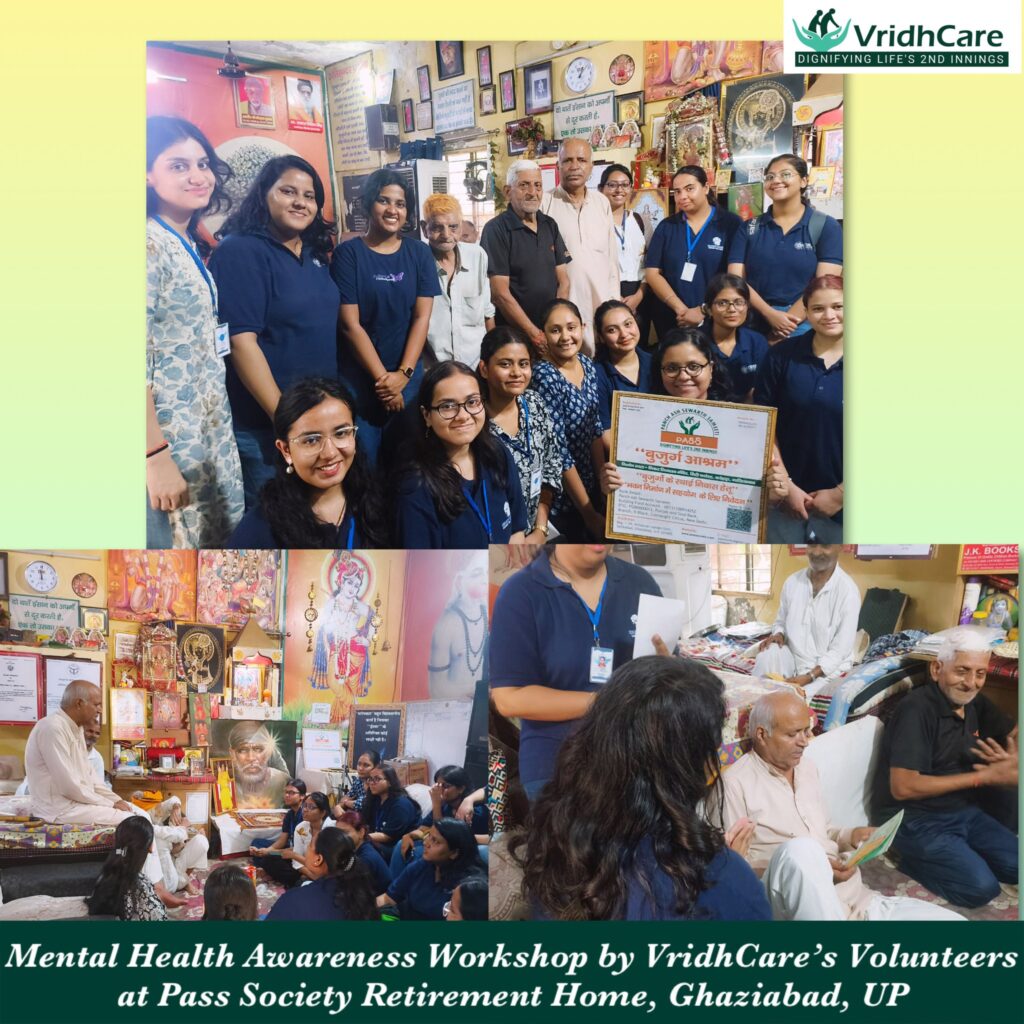At VridhCare, we believe well-being isn’t only about food and health checkups. As people age, emotional stability, mental strength, and cognitive health become just as important — sometimes even more. Loneliness, trauma, loss of confidence, grief, and cognitive decline are common in later years. Our mission includes rehabilitation, not just physically, but mentally too.
In our framework (inspired by Maslow’s Hierarchy of Needs), after securing basic needs, we aim to build belonging, esteem, and self-actualization for elders.
What We Do for Mental Well-Being
Support that feels personal
Our team and volunteers spend time with elders, listen to them, talk to them, and make them feel valued. Many elders tell us that simply having someone sit with them makes their day brighter.
Group activities that bring joy
We organise small group sessions that give elders a chance to interact, share stories, and feel part of a community. These include:
- light movement and yoga
- singing and storytelling
- memory and mind-sharpening games
- drawing, craft work, and simple creative sessions
These activities help reduce loneliness, keep the mind active, and bring smiles back.
Rehabilitation for emotional and cognitive recovery
Some elders have faced deep emotional pain, trauma, or long periods of isolation. Through our rehabilitation efforts, we help them rebuild confidence, reconnect with people, and slowly come back to daily life with a lighter heart.

Building connections
We work closely with old-age homes and partner organisations to make sure elders receive regular interaction, check-ins, and an environment where they feel safe and respected.
How This Helps Elders
- Many elders regain confidence and start participating in daily activities again.
- Their mood and energy improve when they feel heard and included.
- Staying mentally active helps them stay more engaged and independent.
- Companionship reduces feelings of emptiness, isolation, and hopelessness.
- Emotional support helps them rebuild strength after illness, trauma, or family loss.
We see quiet elders begin to open up. We see withdrawn elders slowly join activities. We see lonely elders make new friendships. These small changes mean everything.
The Challenges We See
Working on mental well-being for elders comes with many challenges:
- Many elders hesitate to talk about their feelings.
- Some old-age homes lack the space or staff for regular activities.
- Continuous emotional support needs time, commitment, and trained people.
- Each elder has different needs, and we must understand them patiently.
Yet, despite these challenges, we continue because the impact is real, and the change is visible.
What We Hope to Build
Going forward, VridhCare aims to:
- introduce more regular emotional-wellness sessions
- train more volunteers to understand elder behaviour and needs
- bring mental well-being into all other programs like healthcare, livelihood, and rehabilitation
- create simple resources for old-age homes to support elders better
- reach more elders who remain unseen and unheard
Mental health is not a separate program for us. It is part of every step we take for elder dignity.
How This Connects With Our Other Work
- Healthcare: A healthy mind makes recovery faster and life easier.
- Rehabilitation: Emotional healing is a strong part of our recovery program.
- Livelihood programs: Purpose and meaningful activity improve self-esteem.
- Active aging activities: Engagement and participation keep elders mentally active and hopeful.
Everything is connected, and together these efforts help elders live fuller, happier lives.
Join Us in Healing Minds and Hearts
At VridhCare, we believe emotional well-being is essential to living with dignity in old age. Our vision is to reach more elders, create safe spaces for healing, and ensure no senior feels invisible or alone. To do this, we need caring hands and committed partners.
You can support us by volunteering your time, contributing to our mental well-being and rehabilitation programs, or collaborating with us to strengthen elder care across India. Every act of support helps an elder feel heard, valued, and hopeful again. Together, we can build a kinder, more compassionate future for our elders.
Finding trusted ngo volunteers near me can be confusing without guidance. VridhCare bridges volunteers with verified causes through a structured and transparent process.
This ensures safe, ethical, and meaningful volunteering opportunities in delhi. Government-supported volunteering frameworks can be explored at bolded external reference https://www.mygov.in. These platforms highlight the importance of verified and accountable social participation.

